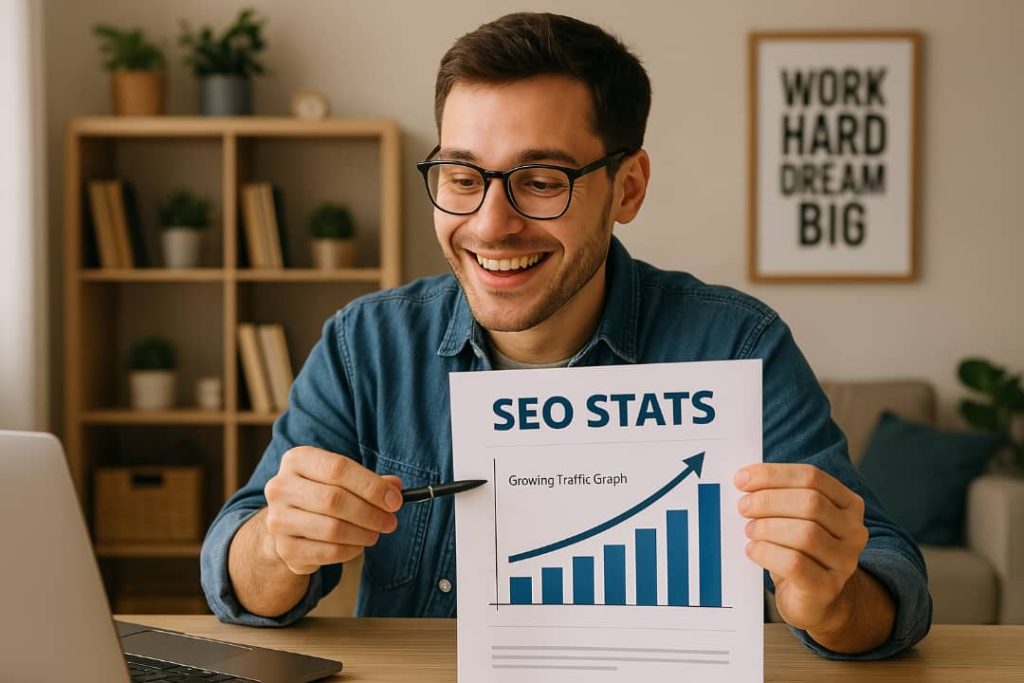Why SEO Is Not Dead: A Powerful Tool for Your Online Visibility
Introduction
In the fast-changing world of digital marketing, strategies evolve rapidly to keep up with new technologies. Some believe that SEO (Search Engine Optimization) is outdated—or even dead. But that’s far from true. SEO remains one of the most powerful tools for attracting organic traffic and growing your online business or blog. Whether you’re running a personal blog or building an e-commerce site, visibility in search engines is essential for long-term success in the competitive world of online business.
SEO: A Constantly Evolving Discipline
The Evolution of Google’s Search Algorithm
Google constantly updates its algorithm to improve search quality and user experience. Major updates like Panda, Penguin, and BERT have significantly changed how websites are ranked.
- Panda targets low-quality or duplicate content, rewarding original and valuable posts.
- Penguin fights against spammy links and manipulative SEO tactics.
- BERT uses artificial intelligence to better understand natural language and user intent.
These updates push bloggers and online entrepreneurs to rethink their SEO strategies regularly, making adaptability a must.
The Rise of AI and Machine Learning
Artificial intelligence and machine learning now play a key role in SEO. Google’s use of BERT technology allows it to interpret content contextually, meaning keyword stuffing no longer works. Successful blogging and online businesses focus on high-quality content, relevance, and user experience—which are core to modern SEO strategies.
The Need for an Adaptive SEO Strategy
For bloggers and online business owners, regularly updating and auditing your SEO approach is critical. This includes tracking keyword trends, improving site speed, and enhancing content quality. An adaptive SEO strategy ensures your blog or e-commerce site continues to attract organic visitors over time.
Why SEO Is Still Crucial: The Numbers Don’t Lie
Organic Results Still Dominate
Research consistently shows that most users click on organic search results rather than paid ads. If you want your blog or online business to thrive, ranking high in search engines is key to generating sustainable traffic without constantly paying for advertising.
Better ROI Compared to Paid Advertising
SEO often delivers a higher return on investment (ROI) compared to pay-per-click (PPC) ads. While ads can drive quick spikes in traffic, SEO builds long-term visibility. For bloggers and entrepreneurs, investing in SEO means steady growth and better conversion rates over time.
Stronger Than Other Digital Marketing Tactics
Social media marketing and influencer campaigns have their place but often produce short-term results. SEO, however, is a long-term strategy. A well-optimized blog post or product page can generate traffic for months or years, making it invaluable for any online business.
Why SEO Remains Essential for Online Success
Organic Search Is a Long-Term Growth Channel
SEO creates a lasting digital asset, like a storefront that’s open 24/7. Unlike paid ads that stop generating traffic once your budget ends, SEO keeps attracting visitors. This makes it especially valuable for bloggers and e-commerce owners looking to grow sustainably.
SEO Builds Trust and Authority
Sites that rank on the first page are perceived as trustworthy and authoritative. High rankings build credibility, encourage backlinks, and increase engagement. For online entrepreneurs and bloggers, this translates into better brand recognition and higher sales or readership.
Better User Experience Is Part of Good SEO
Modern SEO is about more than just keywords. It includes fast loading times, mobile-friendly design, intuitive navigation, and useful, relevant content. Improving these elements benefits both search rankings and visitor satisfaction—key factors for successful blogs and e-commerce sites.
Voice Search and Assistants Are Changing the Game
With the rise of voice search, optimizing for conversational keywords is crucial. People ask natural questions like, “How do I start a blog?” or “What’s the best way to make money online?” Tailoring content to these queries increases your chances of appearing in voice search results and featured snippets.
Common Mistakes to Avoid for Better SEO Performance
- Don’t Rely on Past Wins: Algorithms change fast. Regular SEO audits keep your site competitive.
- Don’t Ignore Technical SEO: A slow or poorly structured site hurts rankings. Focus on speed, mobile compatibility, and clean architecture.
- Never Compromise on Content Quality: Original, valuable content remains king. It’s the backbone of successful blogging and online business SEO.
Tools and Resources to Keep Up with SEO Trends
Use tools like Google Search Console, Ahrefs, and SEMrush to monitor your site’s SEO performance and uncover new keyword opportunities. Continuous learning through blogs, webinars, and courses is essential to staying ahead in digital marketing.
Conclusion
SEO is far from dead. For bloggers and online entrepreneurs, it remains one of the most effective ways to grow organic traffic, build authority, and sustain long-term online success. Investing in smart, adaptive SEO strategies is the key to ensuring your blog or e-commerce brand thrives in a competitive digital landscape.
Frequently Asked Questions (FAQ)
What is SEO and why is it important for bloggers?
SEO stands for Search Engine Optimization, a set of techniques to improve your website’s ranking on search engines like Google. It is important for bloggers because it helps attract organic traffic, increasing visibility and readership without paying for ads.
How do Google updates like Panda, Penguin, and BERT affect my site?
These updates improve Google’s ability to rank high-quality, relevant content while penalizing spammy or low-quality websites. Keeping your content original and user-focused helps you stay compliant and rank well.
Can I do SEO myself or do I need a professional?
Many SEO tasks can be managed by bloggers and small business owners with the right tools and learning. However, complex technical SEO or large websites may benefit from professional help.
How often should I update my SEO strategy?
SEO is dynamic; it’s best to review and update your strategy at least every few months to adapt to algorithm changes and evolving keyword trends.

